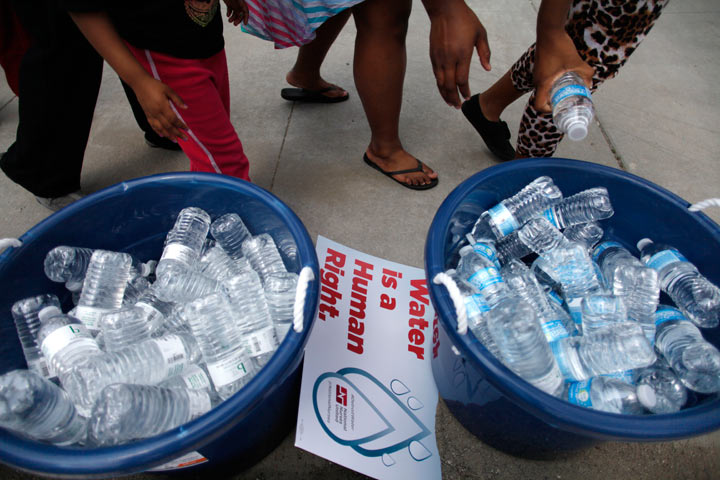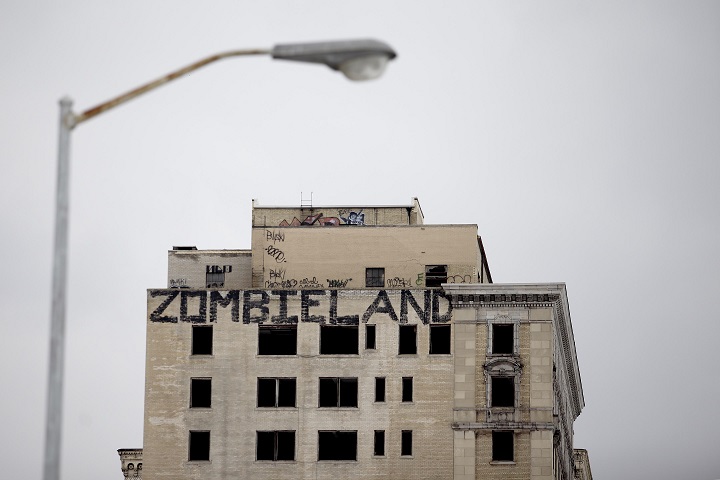TORONTO – Is shutting off water for tens of thousands of Detroit residents behind on their bills a violation of human rights? That’s the argument a Canadian non-profit is making.

The Council of Canadians plans to bring 1,000 litres of water across the Canada-U.S. border to those living in the U.S. with no running water, as part of a symbolic rally July 24.
“The human suffering is that of a major disaster, one that grows every day,” said national chairperson of the Council of Canadians Maude Barlow in a release, who’s calling for U.S. President Barack Obama to declare a state of emergency.
“Water is a human right, and it is unacceptable in a country of plenty, surrounded by the Great Lakes, the largest source of fresh water in the world, that people should go without.”
But the Detroit Water and Sewerage Department (DWSD) remains confident that there are programs in place to help those who truly can’t afford water.
“We have never denied, and will not deny anyone water access for clean, potable water service to anyone who can demonstrate a legitimate, clear cut financial hardship, and we never will,” spokesperson Greg Eno told Global News on Monday.
As Detroit tries to come out of the largest municipal bankruptcy in American history, the city’s water department has been highlighted as a significant issue—responsible for about $6 billion of the $18 billion debt.
Promising to be more assertive toward delinquent customers, the Detroit Water and Sewerage Department (DWSD) mailed out about 46,000 shut-off notices in May, and of those, cut service to 4,531 customers.
DWSD said on June 24 that more than half of customers paid their accounts in full within a day or two of being cut off, and an additional 17,000 are on payment plans.
In June, there were 7,210 shutoffs but 3,118 had water returned—mostly within 48 hours, said Eno.
He said there are three ways to get your water turned back on after it’s been shuttered: 1) make a payment 2) make payment arrangements or 3) enrol in the Detroit Residential Water Assistance Program, a new program informally called “Dr. Wap.”
- Budget 2024 failed to spark ‘political reboot’ for Liberals, polling suggests
- Train goes up in flames while rolling through London, Ont. Here’s what we know
- Peel police chief met Sri Lankan officer a court says ‘participated’ in torture
- Wrong remains sent to ‘exhausted’ Canadian family after death on Cuba vacation
“Dr. Wap is a contributory program where the individual that’s being assisted pays x amount of dollars and the program pays x amount of dollars per month depending on that person’s individual circumstances, need, financial income, things of that nature,” said Eno.
Dr. Wap launched July 7, and draws on a $1-million fund that came from Detroit residents who opted in to donating 50 cents on each of their own water bills. There are a number of criteria that must be met to be eligible for the program, but the water shut-off is suspended for those people who are in the process of being approved.
Eno said there are 440 families who have been pre-screened and are eligible to move forward in the process, but no dollars have yet been assigned since it’s so new and there is a seven- to 10-day processing time.
Eno recognizes that proving eligibility or proving that you truly cannot afford water can be a challenge for some families e.g. if you’re home-bound because of a physical disability. But he says the programs are available, and it’s incumbent upon the customer to reach out.
Thursday’s event will see 1,000 litres of water brought to the Spirit of Detroit statue for a rally in the city, then activists will deliver the 50 jugs to St. Peter’s Church. The event is being organized by the Council of Canadians’ Windsor chapter, as well as the Detroit People’s Water Board, and will feature a speaker from the Michigan Welfare Rights Organization.
The groups sent a letter to the United Nations Human Rights Office of the High Commissioner in June, saying the water shutoffs will leave poor people at risk.
“Disconnections due to non-payment are only permissible if it can be shown that the resident is able to pay but is not paying,” water and sanitation expert Catarina de Albuquerque said in a statement issued from the United Nations in Geneva. “In other words, when there is genuine inability to pay, human rights simply forbids disconnections.”
UN experts said the DWSD is shutting off water in households where the bills haven’t been paid for two months. The experts estimated 30,000 households are expected to be denied water over the next several months. In total, there’s about 90,000 active customers who are delinquent on their bills, totalling an estimated $90 million.
But Eno referred to the June numbers to explain that estimates may not reflect needy families who can’t afford the bills.
After subtracting the 3,118 customers who had water turned back on after the 7,210 shutoffs in June, Eno said the DWSD will look deeper into the 4,000-some that remain, for issues like abandoned homes and squatters.
“In that original shutoff number also are people who we believe are having illegal water…In other words, it was turned off and then it’s been turned back on again.”
He said a red flag is if the DWSD doesn’t hear from the customer with an attempt to get the water turned back on—either with a payment arrangement or other assistance program.
“What’s also happening is enterprising people are following behind our shutoff crews, and almost immediately after we shut it off, they’re turning it back on – and charging the residents a fee,” said Eno.
He warned those “thieves”—who use the same tool as legitimate workers—will drive away, leaving residents on the hook for fees as high as $650 if they’re caught multiple times, since they’re the ones obtaining illegal water.
“To the honest people out there who may be desperate – don’t do that. Get the water turned on the right way which is to contact us, get into a payment arrangement, and we’ll turn you back on legally.”
With files from The Associated Press



Comments